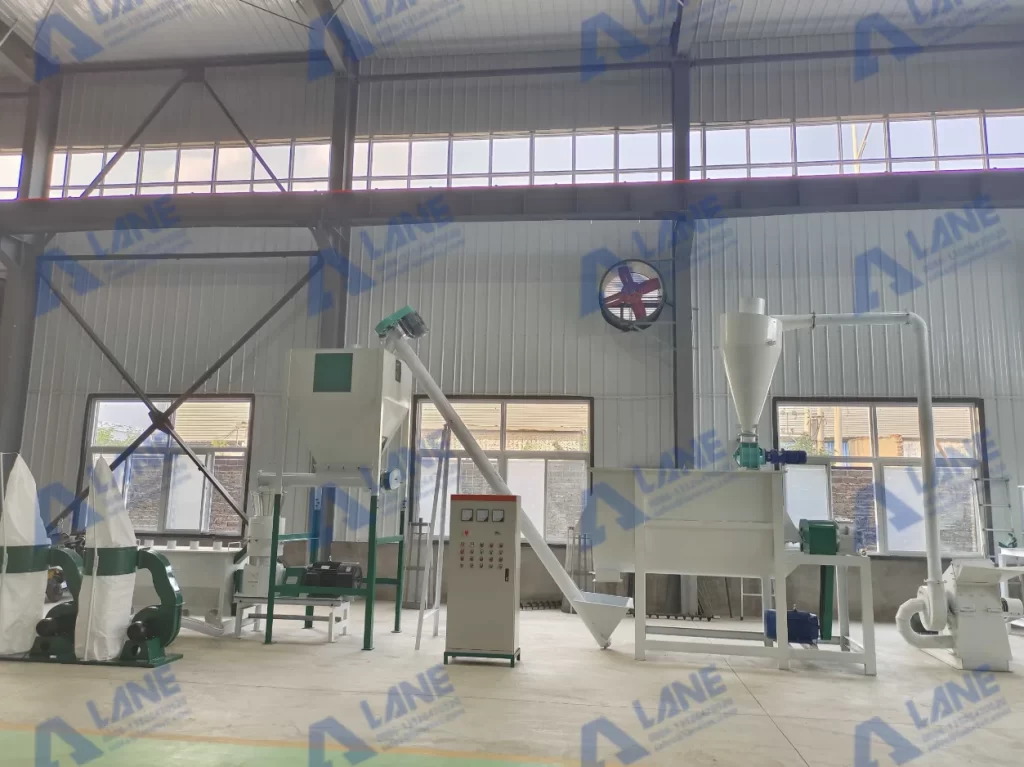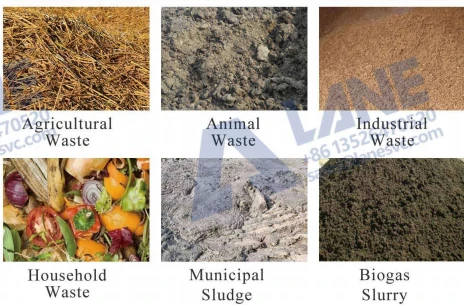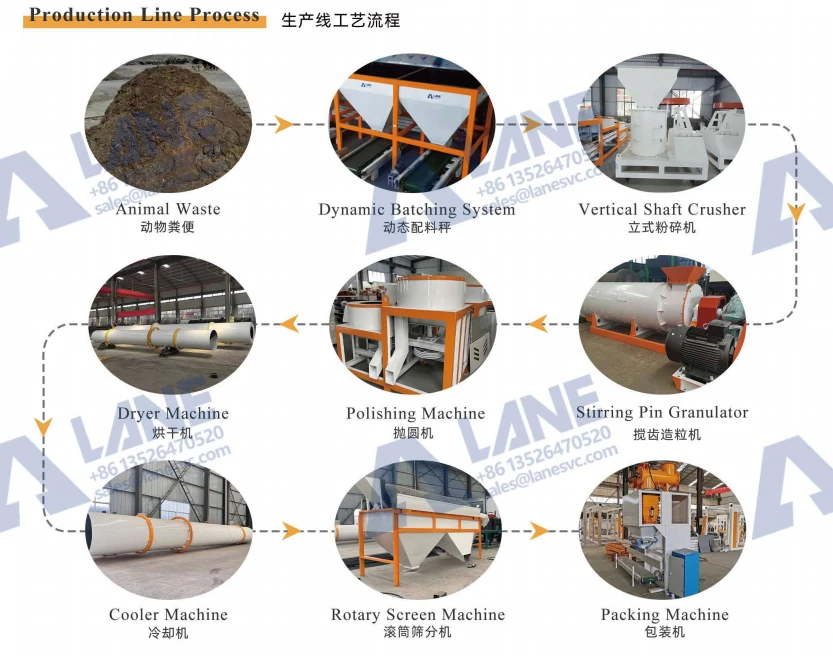With the increase of global food consumption also increased the global agricultural demand. To keep up with this demand, technology and fertilizer is being used for every agricultural industry of the world. Both small and large industrial scale farmers use fertilizers. Chemical fertilizer has a risk of damaging the water source of nearby area if not used properly. Overusing them risk nitrogen pollution. To avoid this governments are giving more priority to organic fertilizers.
Establishing a small scale organic fertilizer production line presents a viable business opportunity. Unlike large-scale industrial operations, these small scale organic fertilizer production facilities are designed for efficiency, lower capital investment, and adaptability.
This makes this fertilizer production line to be accessible to community, individual or small businesses. A well-planned production line transforms raw organic materials such as animal manure, agricultural waste, and food wastes into a high-quality, marketable fertilizer. Small scale organic fertilizer production line not only provides farmer with fertilizer, It also helps clean up the environment. This article provides a detailed, step-by-step exploration of a small-scale organic fertilizer production process.

1.Raw Material Preparation and Composting
The first and most crucial stage in any organic fertilizer production is the preparation of raw materials and composting. This steps determines the quality of the final product.
Raw Material Selection:
The raw material for the organic fertilizer can be any organic matter that can be found on the nature. Various types of organic matter provides various property to the fertilizer.
Animal Manure: Chicken, cow, rabbit, and horse manure are excellent bases. They have high nutrient content and are available.
Agricultural Waste: Crop residues like straw, rice husks, and corn cobs provide carbon and improve the structure of the final fertilizer.
Food Processing Waste: Spoiled grains, fruit and vegetable pulp, and other organic are available resources that count as agricultural waste.
Other Organic Matter: Forestry waste, seaweed, and certain types of sludge can also be used after proper treatment.

The Composting Process: Composting is a biological process where microorganisms break down organic matter into a stable, soil substance. The key to efficient composting is maintaining the right balance and condition for microbial activity:
This balance can be achieved by mixing different type of composting raw materials. Some material provide high carbon and some material provide high nitrogen. Carbon-rich materials are mixed with nitrogen-rich materials to achieve this balance.
The composting pile must have around 50-60% water content and must be turned by the compost turner after certain period of time. This provide oxygen to the pile. Oxygen is critical for aerobic bacteria, which decompose the material without creating foul odors. LANE Heavy Industry Co., Ltd. offers compost turners that are economical for small scale organic fertilizer production. We have tractor pulled, crawler compost turner and wheel type compost turner for small scale production line. These machines efficiently turn the compost piles, introducing oxygen, releasing heat and gases, and ensuring a uniform decomposition process, which reduces the composting time from months to just a few weeks.
2.Feeding Process and Composting
Once the composting is over, the raw materials turns into soil like black substances with no odors. It is now ready to enter the processing phase. The feeding machine acts as the controlled entry point. Raw material is firstly placed hare to be distribute to the crusher. A consistent and measured feed rate is vital for the smooth operation for small scale organic fertilizer production. Inconsistent feeding can lead to blockages, overloading, and an uneven final product. LANE Heavy Industry provides various feeder options, such as dynamic batching machine, static batching machine or vibrating feeders, which are designed to handle the clumpy and lumps of composted organic matter.
3.Crusing
The composted raw material then moved into the crusher. The raw materials often contains clumps, lumps which must first be crushed before it can be made into granuals. The LANE vertical shaft crusher is a key piece of equipment for small scale organic fertilizer production. It makes the raw material into a fine, uniform powder. This machine utilizes a high-speed rotating vertical shaft equipped with hammers or blades that impact and shear the organic matter.
Importance of Crushing: A fine uniform powder is critical for several reasons.
Fine powders are more likely to be made into uniform pellets. It is more efficient to make granules from fine powders.
For a small-scale organic fertilizer production setup, LANE Heavy Industry’s vertical crushers are engineered with durable, wear-resistant materials to handle the inconsistent nature of organic compost, ensuring long service life and minimal maintenance.
4.Stirring Pin Granulator
The heart of the small scale organic fertilizer production line is its granulator. For small scale organic fertilizer production, LANE stirring pin granulator provides the most efficient solution. This machine transforms the powdered raw material into dense, spherical pellets. Its working principle is high-speed rotating pin which is inside a drum creates stirrers that create a powerful centrifugal force and friction.
The Granulation Advantage: Granulated fertilizer is preferred in the market because it is easier to handle, transport, store, and apply using mechanical spreaders. It also has a slower nutrient release pattern compared to powder fertilizer.
5.Polishing Machine
Freshly formed granules from the granulator often have a rough surface. It also sometime contain granulated powder. The LANE polishing machine is designed to address this. This polishing machine is designed to smooth and round these pellets. This rotating drum-type equipment gently tumbles the newly formed granules, causing them to rub against each other. A well-polished pellets are more resistant to breaking and dust formation during handling, packaging, and transportation. This makes them valuable to the small scale organic fertilizer production.
6.Drying Machine
The granules have high moister content after polishing. At this stage the ganules are soft and prone to caking, . The drying machine is essential for this purpose. Typically, a rotary dryer is used, where the granules are fed into a slowly rotating, slightly inclined drum through which hot air is passed.
Efficient Heat Transfer: As the drum rotates, The granules passes through the rotating drum while being exposed to a controlled flow of hot air, ensuring efficient and uniform drying. This also acts as a secondary granulation. LANE dryers for small scale organic fertilizer production ensures efficient heat transfer and uniform drying, which is crucial for preserving the quality of the organic fertilizer.
7.Cooling Machine
After coming out of the Dryer the dried granules are often very hot and fragile and cannot be packed immediately. The cooling machine solves this problem for small scale organic fertilizer production. Its not only dries the granules it also harden them. Similar in design to the dryer, a rotary cooler uses ambient air instead of hot air to cool the granules. Using a counter-flow of ambient air, this rotary cooler systematically lowers the temperature of the granules. This step is vital for achieving a hard, durable, and stable organic fertilizer product.
Benefits of Cooling: Cooling hardens the granules, It increases their strength and durability. It also halts the drying process at the desired moisture level and prepares the product for screening and packaging. By integrating a cooling system, LANE Heavy Industry ensures that the fertilizer granules are stabilized, which is crucial for maintaining product integrity and extending shelf life .
8.Rotary Screen Machine: Quality Control through Sizing
After cooling, the fertilizer granules will have a range of sizes. The rotary screen machine (or rotary screener) is used to separate the on-size particles from the undersized and oversized ones. This machine consists of a rotating cylindrical screen, often with multiple sections of different mesh sizes.
The Screening Process: As the granules travel through the drum, undersized particles, dusts, fall through the screen first, followed by the desired sized product. Oversized particles are discharged at the end. The powders, and undesired sized are sent back to the crusher through the belt conveyor, ensuring zero waste and maximizing raw material utilization.
9.Packing Machine: The Final Touch
The final stage in the LANE production line is packaging. The high quality uniformed organic fertilizer granules that are made from agricultural waste are sent to the packing machine. This packing machine can automatically weight the products and filled into bags. The weight and bag size can be configured from 5kg retail bags to 25kg or 50kg, 100kg sacks. The automated sealing and labeling complete the transformation. These systems can achieve a high degree of weighing accuracy (e.g., ±0.2%)

Conclusion: The fertilizer production line offered by LANE Heavy Industry Co., Ltd. provides a complete and efficient solution for small scale organic fertilizer production. Establishing a small-scale organic fertilizer production line is a profitable and environmentally responsible venture. By processing organic waste through stages of composting, crushing, granulating, polishing, drying, cooling, screening, and packaging small business, farming communities or individuals can create organic fertilizer in small scale and help with agriculture recycling as well as providing farmers with fertilizer while making profit.
For more details, please feel free to contact us.
Henan Lane Heavy Industry Machinery Technology Co., Ltd.
Email: sales@lanesvc.com
Contact number: +86 13526470520
Whatsapp: +86 13526470520